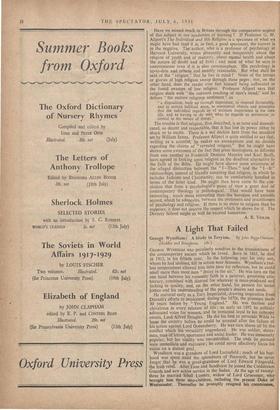Psychology and Religion
The Individual and His Religion: A Psychological Interpreta- tion. By G. W. Allport. (Constable. xis. 6d.) Ir is said that on a day in the 1930s two Cambridge dons were passing the Divinity School, which is the headquarters of the theo- logical faculty in the university. As they passed by, one who was a lecturer in psychology said to the other who was a lecturer in anthropology: "You know, in fifty years' time we shall be in there." Theologians do not yet seem to be seriously alarmed by the threat to the remaining provinces of the former queen of the sciences from the professors of newer disciplines, any more than clergymen are apprehensive that they will soon be thrown out of business by the increasing regiment of psychiatrists. Generally speaking, theo- logians and psychologists go their respective ways with a minimum of inter-communication. At least, this appears to be the case in Great Britain. In the U.S.A. it is otherwise. Ever since William James blazed a new trail with his Varieties of Religious Experience. the psychology of religion is a subject that has enjoyed considerable vogue there among divines as well as among psychologists. Have we missed much in Britain through the comparative neglect of this subject in our academies of learning ? If Professor G. W. Allport's The Individual and His Religion is a specimen of what wo might have had (and it is, in fact, a good specimen), the answer is in the negative. The author, who is a professor of psychology at Harvard University, writes pleasantly and temperately about the religion of youth and of maturity, about mental health and about the nature of doubt and of faith ; and most of what he says is commonsense even if it is also commonplace. His psychology is up-to-date and urbane and sweetly reasonable. But what shall be said, of the " religion " that he has in mind ? None of the terrors or glories of high religion sweep through these pages ; nor, on the other hand, does the reader ever feel himself being suffocated in the foetid swamps of low religion. Professor Allport says that religion deals with " the outward reaching of man's mind," and he
defines " the mature religious sentiment " as _
" a disposition, built up through experience, to respond favourably, and in certain habitual ways, to conceptual objects and principles that the individual regards as of ultimate importance in his own life, and as having to do with what he regards as permanent or central in the nature of things."
The trouble is that religion, thus described, is so tame and domesti- cated, so decent and respectable, that it has lost its power either to shock or to excite. There is a sad decline here from the standard set by William James. Professor Allport is quite entitled to say that, writing as a scientist, he makes no assumptions and no denials regarding the claims of " revealed religion." But he might have shown some awareness of the fact that great theologians, so different from one another as Frederick Denison Maurice and Karl Barth, have agreed in looking upon religion as the deadliest alternative to the faith of the Bible. He might have shown some awareness of the alleged distinction between the " I—Thou " and the " I—It " relationships, instead of blandly assuming that religion, in which he includes Judaism and Christianity, can be comfortably handled in terms of the latter kind. HO might then have come to the con- clusion that from a psychologist's point of view a great deal of contemporary theology is pathological. That would have been interesting ; much more interesting than the harmless and amiable accord, which he advocates, between the professors and practitioners of psychology and religion. If there is no more to religion than he supposes, it does not deserve the respect which he shows for it. The Divinity School might as well be vacated tomorrow.
A. R. VIDLER.























































 Previous page
Previous page